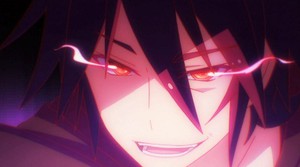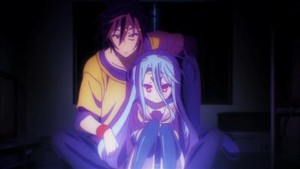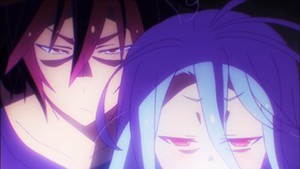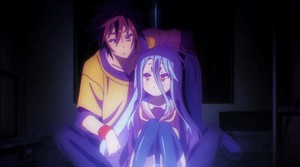The Spring 2014 Anime Preview Guide
No Game No Life

Hope Chapman
Rating: 1.5
Review: God I'm sick of smug unflappable badass nerds with no remotely human character traits in genre fiction. All fiction really, but the nerd variant seems to show up more often in fantasy and sci fi, don't they? That's what bugs me the most about No Game, No Life: terrible characters. I could harp on the oversaturated color-vomit art design that sacrifices any sense of taste in favor of jingling gaudy keys in its audience's face. (The fairy-god with three different colors in each eyeball and pupils that were suits in a card deck was hideous.) I could harp on how it rollicks in its own terrible self-satisfied philosophies and uninspired world-building through tedious infodumps in place of any interesting onscreen action, to the point where it skips its most interesting potential scenes in favor of waxing our ears off some more. I could spend this entire review on how both of those things irritated me to no end.
But far more maddening than anything else is the shambling undead cliche that is our protagonist: a misunderstood nerd who underneath his clammy exterior is secretly the most brilliant and perfect being who ever lived and will very soon win all the respect and sexual attention he has so far been denied. It's lazy wish fulfillment au gratin or in my case agh grating, and the stench it leaves on the entire "lost in a game world" premise falls even heavier in one episode than in 25 of Sword Art Online's. Protagonist Sora, along with his adoring super-moe sister Shiro (ick), is such a masterful (but misunderstood!) gamer that he's transported to a ludicrous alternate universe entirely ruled by games and only games, and there he instantly becomes the Gary Oak of this Pokémon World for Misanthropic Shut-ins. Inside of one episode he has used his super-genius along with a few sly cheating manuevers to shock and awe all his opponents, leaving ladies' knees a-tremble and experienced gentlemen tugging at their collars in fear of his tough customer-ness. It sounds like an exaggeration, but the execution is just that blatant. He even brandishes this moxie in a Western-style tavern while wearing an untouchable stranger cloak.
The episode concludes with our hero musing to himself about how "most people would probably try to get out of a world ruled by games, but I finally feel like I belong AND ISN'T THAT IRONIC?" By the time you roll your eyes back down from the back of your skull, he's answering a knock at the door from one of the women he rescued earlier, who is now naked and blushing for permission to enter. Of course he'll have to get his napping sister off his crotch first. Yes, she's literally napping on his crotch.
I added the .5 to my score of 1 because the show is animated and directed well when it's not monologuing your ear off, but nothing has made me roll my eyes, gag, or feel more irrationally angry this season than this insulting self-insert pandering trash heap. I'm sure plenty of people with higher tolerances for its particular flavor could find something of worth here, but this hit all my worst buttons relentlessly for twenty minutes straight. Even in a best case scenario, it's nothing special, just another trapped-in-a-video-game scenario starring a loathable nerd. And yes, it's entirely possible that it's aping Problem Children, which isn't a great anime or anything, but it's better than this, just watch Problem Children.
No Game, No Life is available streaming at Crunchyroll.com.

Rebecca Silverman
Rating: 2.5 (out of 5)
Review:
Sora and Shiro are shut-in siblings who are also amazing gamers. They've been gronking every game, each playing two characters, and have reached the status of urban legends. But they are unhappy. They have their own issues that have led to their shut-in, NEET (in the case of Sora) status, and all they want to do is play games. So when a mysterious email, followed by someone coming through the computer screen, invites them to a game-based world operated by only ten rules, the siblings jump at the chance.
Parts of No Game, No Life are quite interesting. The Through the Looking Glass aspects of their journey to the kingdom of Elkia are neat, as is the way that there are no black outlines, and very little true black space, in the imagery. On the other hand, that lack of black space wore out my eyes very quickly and honestly made it difficult for me to concentrate on the show. There's also the problem of the fact that neither Shiro nor Sora come off as being particularly likeable characters. Granted, this is the first episode and they've just come from a world that they really felt uncomfortable in, so they are understandably not their best selves. Regretfully, it is very hard to drum up any sympathy for either of them, and if that doesn't change, it could be a drag on the show.
This episode also suffers from a great deal of exposition. From the opening when we learn about the players known as “Blank” (Shiro and Sora of course) to the listing of the ten rules as our heroes are falling into their new world, there are a lot of moments when we're just having information told to us without any real accompanying action. Most of the actual action is gameplay, which is also a bit of an issue, as even SAO noted that it is much more fun to play a game than to watch someone else do so. Again, this could be resolved as things get going, but in its first episode, No Game, No Life is a talky, hard to focus on story with unlikeable characters. It deserves another chance to change this, but as opening episodes go, I found this pretty weak.
No Game, No Life is available streaming at Crunchyroll.

Carl Kimlinger
Rating: 3.5
Review: No Game is a show about gamblers. Maybe it's a bit of a gambler itself? It spends much of this episode stacking the odds against itself, and the rest of it trying to beat them. An interesting strategy, but it works, so who am I to judge? The players known as Blank are legends in the gaming world. They never give themselves a name—thus “Blank”—and they never lose. Not to cheaters, not to experts, not to chess programs designed to beat the crap out of grandmasters. In real life, Blank are brother and sister: Sora and Shiro, a couple of hopeless NEETs who spend their every waking minute playing games, games, and more games. They get a mysterious email one day, and one chess game later they're transported to a world ruled by a capricious god of play, where everything can be gambled and anything won—a world that runs on games.
It's an awful idea for a show: a mixture of game-made-real and people-transported-to-alternate-dimension premises, both of which are enough—on their own—to suck the life out of the most dedicated fan. And yet… The show itself is, if not a blast, at least genuinely fun. That's in part thanks to the gorgeous, over-saturated visuals. It's in part because of Sora, with his wicked sense of justice and gleefully pathological love of play. It's partly thanks to the show's sense of humor, which skillfully undercuts the mood whenever it waxes serious. But most importantly, it's because of the gaming. Sora and Shiro are essentially cheater-busters—they knowingly play the cheaters on their own turf—which adds an interesting extra tension to their games. Their introduction to a game in which a player is trying to cheat her way into rulership of a kingdom opens up possibilities—King Sora!—that make the idea of tuning back in quite pleasant. Who'd've thunk?
No Game, No Life is available streaming at Crunchyroll.
 Theron Martin
Theron Martin Rating: 3.5 (of 5)
Review: “Urban legends are a type of wish. Because, in reality, the least interesting answer is usually the correct one.”
Though this isn't the first line of No Game, No Life (it actually comes up a minute or two later), it is the main point of the series’ prologue. In this case 18-year-old Sora and 11-year-old Shiro, a pair of NEET siblings, are the “least interesting answer” to one particular urban legend about a group of players who leave their names blank and unbeatably win any game they play, even when their opponents cheat. The presumption is that they must be cheating themselves, but no, they're just that good; they can even play multiple accounts simultaneously (even using their feet, if necessary). He is a master of games of chance, while she is a mathematical genius and thus a master of games of skill; even computer programs designed to beat Grandmasters at chess cannot beat her. Both have problems with the real world because they look at it as a crappy game with too many unpredictable variables. When they answer a mysterious email from someone who seems to have an awful lot of insight into them, they find themselves involved in another urban legend, one about being drawn into an alternate world shaped by a god called Tet (who apparently was the only survivor of a divine war for control of the world because he simply didn't participate), who has decreed that everything – all conflict, even how leaders are chosen – is determined by the outcome of games in which both parties stake something of equal value. As Sora starts to make headway in this world, he contemplates how heroes in this situation in stories always struggle to get back to their home worlds. That will not be him or Shiro, though, for a world where their fates are determined by games is the ideal world for them.
Let's get this out of the way first: The original light novel writer apparently decided that lolicon and bro/siscon separately were not creepy enough, so he decided to combine them. (And no, there's nothing overtly sexual in this relationship, but Sora and Shiro definitely give off a certain vibe.) Set that aside, though, and this is actually a surprisingly intriguing spin on standard stories about modern-world characters being transported into fantasy worlds and/or games. Without question a heavy degree of wish fulfillment is implicit; the prologue all but outright says as much when it frames the story as an urban legend come to life. By making that the whole point of the story, rather than just the framework for it, the writing seems intent on analyzing a wish fulfillment in execution as it plays out, and that's an angle these kind of things don't normally take. Sora is also a bit more of a character than guys in his role normally are.
The technical merits, courtesy of Mad House, produce a distinctive character design style and overall look which may not be the prettiest but lend a sense of artificiality to the material, an effect which, if done intentionally, actually serves the series well. Spoilers from the light novels suggest maybe a Last Starfighter angle, which would be interesting. There's a lot of room for this one to flop, but if it sticks to its guns and doesn't just play out just as a “Sora is indomitable” scenario then there's also a lot of room for something good here, too.
No Game, No Life is currently streaming on Crunchyroll.
discuss this in the forum (748 posts) |
this article has been modified since it was originally posted; see change history
back to The Spring 2014 Anime Preview Guide
Season Preview Guide homepage / archives